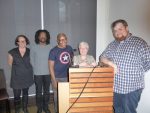 Jamie Coville has, as always, recorded the best of the panels from TCAF, including a shocking number in which I participated. YOU can hear the audio of the panels here and the DWAs here. The DWAs are notable for the extraordinary remembrance that Seth offered or Dawwyn Cooke and also the induction of James Simpkins into the Giants […]
Jamie Coville has, as always, recorded the best of the panels from TCAF, including a shocking number in which I participated. YOU can hear the audio of the panels here and the DWAs here. The DWAs are notable for the extraordinary remembrance that Seth offered or Dawwyn Cooke and also the induction of James Simpkins into the Giants […]
Viewing: Blog Posts Tagged with: Podcasts and other media, Most Recent at Top [Help]
Results 1 - 25 of 78
Blog: PW -The Beat (Login to Add to MyJacketFlap)
JacketFlap tags: Awards, Podcasts and other media, audio, doug wright awards, Darwyn Cooke, Top News, Seth Wimbledon, CAFs, TCAF 2016, Add a tag
Blog: PW -The Beat (Login to Add to MyJacketFlap)
JacketFlap tags: Los Angeles, UFO, haunting, LA, Nerdlebrity News, chris hardwick, Wondercon, Top News, Wonder-Con, Nerdist News, Small Presses, podcast, Sports, Conventions, Culture, Commentary, Podcasts and other media, Podcasts, Add a tag
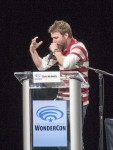 By Nicholas Eskey If you label yourself a “nerd” and wear it with pride, undoubtedly you already follow Chris Hardwick’s Nerdist News. The quick witted comedian and mega-nerd took heads the podcast driven news network for nerds with a wonderful collection of colleagues and special guests, discussing everything from the current state of all things […]
By Nicholas Eskey If you label yourself a “nerd” and wear it with pride, undoubtedly you already follow Chris Hardwick’s Nerdist News. The quick witted comedian and mega-nerd took heads the podcast driven news network for nerds with a wonderful collection of colleagues and special guests, discussing everything from the current state of all things […]
Blog: PW -The Beat (Login to Add to MyJacketFlap)
JacketFlap tags: Thrillbent, Deadpool, layered comics, Marvel Infinite, Word Balloon, Comics, Podcasts and other media, Cable, Reilly Brown, Add a tag
 The fairly recent innovation of layered comics used by Thrillbent, Marvel Infinite and others is still a mystery to most, even though I’m convinced it’s going to be a future if not the future of digital comics. But creator Reilly Brown, one of the very first to utilize the format with Power Play, went into a good amount […]
The fairly recent innovation of layered comics used by Thrillbent, Marvel Infinite and others is still a mystery to most, even though I’m convinced it’s going to be a future if not the future of digital comics. But creator Reilly Brown, one of the very first to utilize the format with Power Play, went into a good amount […]
Blog: PW -The Beat (Login to Add to MyJacketFlap)
JacketFlap tags: podcast, Indies, Podcasts and other media, Podcasts, E-publishing, Frank Miller, R. Sikoryak, google play, more to come podcast, Hoopla, comic book podcasts, best books 2015, Add a tag
Recorded live in New York, it’s More To Come, the weekly podcast of comics news, interviews and discussion with Calvin Reid, Kate Fitzsimons and The Beat’s own Heidi MacDonald! This week, the More to Come Crew – Heidi “The Beat” MacDonald, Calvin Reid and Kate Fitzsimons – discuss digital comics news from Archie, Hoopla, Google […]
Blog: PW -The Beat (Login to Add to MyJacketFlap)
JacketFlap tags: Manga, Podcasts and other media, Supergirl, Naruto, Comics Media, Masashi Kishimoto, Big Two Comics, Top News, more to come podcast, Attack on Titan, shingeki no kyojin, Add a tag
In this week’s podcast, the More to Come Crew – The Beat’s own Heidi MacDonald, Calvin Reid and Kate Fitzsimons – discuss the new Supergirl tv show and writing to appeal to female audiences, The New York Review of Books opening a comics publishing imprint, Attack On Titan and what its lack of American press […]
Blog: PW -The Beat (Login to Add to MyJacketFlap)
JacketFlap tags: #Marvel, Brandon Montclare, Podcorn, Moon Girl and Devil Dinosaur, Camilla Zhang, DC, Podcasts and other media, Breaking in, Top News, Add a tag
How to be yourself and still get accepted into the "Comics machine," man.
Blog: PW -The Beat (Login to Add to MyJacketFlap)
JacketFlap tags: Interviews, Comics, Culture, Podcasts and other media, Top News, Top Comics, podcast, Alternate Realities, Local Comic Shop, My Comic Shop History, Add a tag
In the end, memories are what make us who we are. Although they slip away so easily, these small fragments of past inform our future decisions and influence us every moment we’re alive. For most of us comic book readers, a formative moment in our personal histories is the first time we step into a comic shop. The pulpy smell of fresh floppies stacked in Diamond stamped boxes. The glistening translucent cases filled with TCG singles at exorbitant prices. The stern and booming voices of people arguing Batman chronology in the back by the trades.
The places individual comics fans make these universal memories shape their lives. For Director and Comics Historian Anthony Desiato and many other comics luminaries from upstate New York such as Rocket Girl writer Brandon Montclare, these formative experiences took place at Alternate Realities, which is going out of business after nearly a quarter of a century.
Desiato has made it his mission to chronicle the store’s final days through his podcast, My Comic Shop History. The last episode of this audio series comes out today, and in honor of his intriguing work and Alternate Realities’ storied history, we sat down with him to talk about the legacy of the store.
Alex Lu: So for those unfamiliar with Alternate Realities, can you give us a brief overview of your store’s history and what makes it special?
Anthony Desiato: Alternate Realities is (soon-to-be “was,” sadly) a comic book store in Scarsdale, NY, that is closing up shop for good after 23 years.
The store is the subject of my independent film, My Comic Shop DocumentARy, and my current podcast, My Comic Shop History.
The podcast is a 12-episode exploration of the store & its closing from the perspective of past and present owners, customers, and employees. We’ve been peeling back the curtain on the retail side of the comic book industry as we discuss the store’s inner-workings and comic shop culture generally.
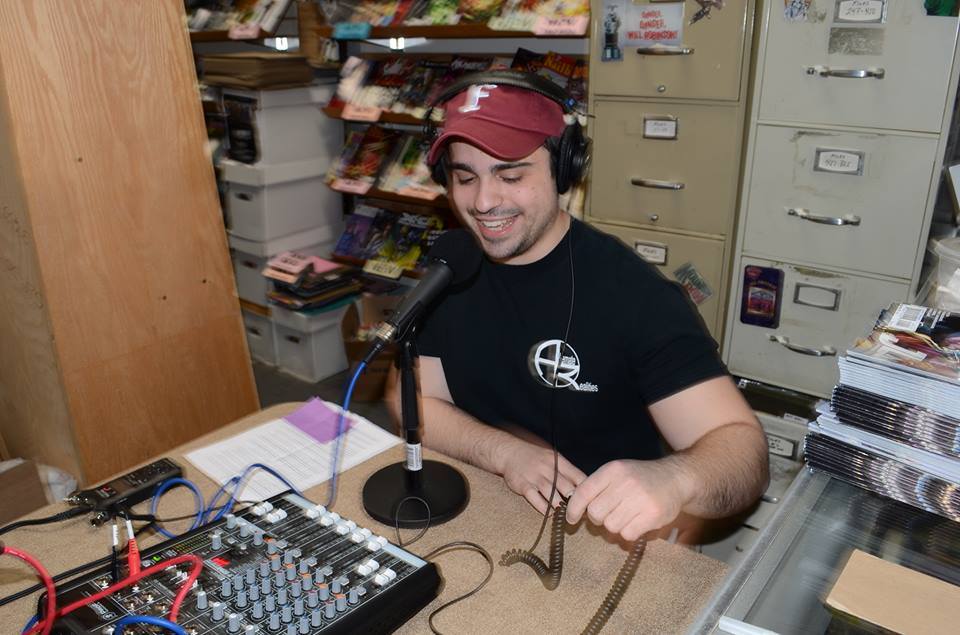
What makes the store special—and the reason I’ve found it such a source of inspiration—is the community.
We count among our ranks a customer who worked at T.G.I. Friday’s but claimed to have killed 25 people in the line of duty as a secret agent; our resident curmudgeon, a former flea market vendor who condemns modern society with language that would make a sailor blush; and the store’s owner, Steve Oto, who traded his legal career for a life behind the counter and a very love-hate relationship with his clientele.
Lu: What’s your role in the store and how long have you been involved?
Desiato: Heroes World (a long-defunct store in White Plains) was my first comic shop, and when it abruptly closed on me during elementary school, Alternate Realities became my new go-to place. For the first few years of my patronage there, I was just the shy kid who would pick up my books every week while my mother waited in the car.
In high school, Steve offered me a summer job, and that was my entry into a whole new world. Throughout high school and college, both my level of responsibility at the store as well as my friendships with the guys who shopped & worked there would grow.
It wasn’t until the end of my employment there (during law school) that I began to take on my current role of—for lack of a better term—“store chronicler.” That new path gave birth to my film about the store, its spinoff (By Spoon! The Jay Meisel Story), and now the podcast.
Lu: What do you think drove the decision to close the store?
Desiato: If you believe Steve’s closing announcement, he’s closing in large part “because of those customers who have left me in the lurch” by not buying the items they ordered. However, if you truly analyze the situation, as we’ve been doing over the course of My Comic Shop History, it becomes clear that the stated reason for closing is perhaps a bit disingenuous.
If customers are reneging on their orders, there are steps a store can take to at least try to remedy the situation first. Closing the store is the nuclear option! It’s not really a proportionate response to address what’s ultimately a small group of delinquent customers.
What we all realize is that Steve’s complaints are really just symptomatic of a growing frustration and fatigue with running the business.
In Episode 7 (“Comic Shop Business School”), I spoke with the owner of The Spider’s Web, a relatively new comic shop in Yonkers. That owner is two years in and still has his passion for the business and the hobby.
After 23 years of the grind of running a small business, Steve simply doesn’t have that anymore. As he has said many, many times over the years—in person, on Facebook, in My Comic Shop DocumentARy, and in My Comic Shop History—he’s tired. And I don’t think anyone would dispute that he’s earned his rest.
Lu: How has the community responded to the store’s closing?
Desiato: That’s really what the podcast is all about and why I wanted to do it in the first place.
Aside from the friendship we share, what I hope listeners take away from this show is how much we all care about “The Store.”
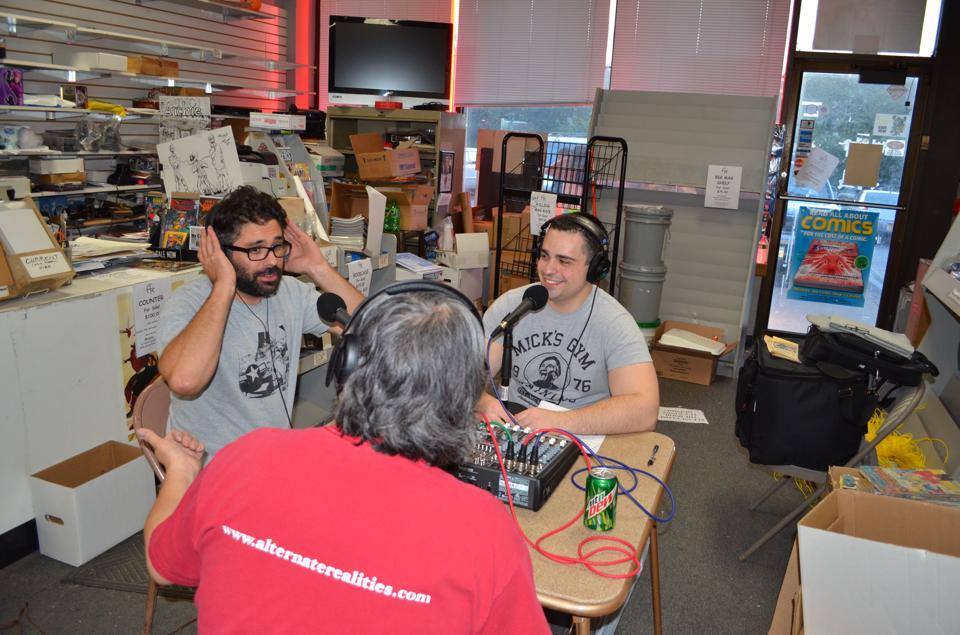
Everyone who has participated in the podcast has worked, owned, or volunteered at Alternate Realities at some point. We’ve all invested time and effort and wanted the store to be as strong as possible.
To see the store end in this way has been very bittersweet. Not to speak for the entire community, but for myself and many of the people I spoke to on the podcast, I feel there’s a sense of sadness that it came to this, acceptance that it’s the right move for Steve, and, most importantly, appreciation for everything the store has meant to us. It’s been our clubhouse, truly.
Lu: Given that Alternate Realities has such a long and storied history, those who have been there have had the unique perspective of having seen the comics reading audience grow exponentially and the industry dramatically change. How would you compare comics at the store’s opening to comics now, at the store’s close?
Desiato: Well, seeing as how I was 5 when the store opened, I’m not sure I can really give a full answer to that question! Interestingly, though, the store opened the same year that “The Death of Superman” (my first comic) came out. That was arguably the beginning of “event” storytelling as we know it today, and the store is closing amidst Convergence and Secret Wars, two huge events from the Big Two. So, in a way, maybe not that much has changed!
To answer your question more specifically: Based on the time that I’ve been affiliated with Alternate Realities, I would argue that we have not seen huge shifts the way you might expect. For example, the rise of comic book movies didn’t necessarily drive hordes of new customers to the store. At the same time, the advent of digital comics did not erode our customer base too much, either.
Lu: What do you think is the next big thing for the industry?
On the retail side, one of the things we talk about on the podcast (we do a “Comic Shop Business School” series-within-a-series across a number of episodes) is how comic shops need to be a “destination” in order to survive these days. Areas to hang out, events, signings–things like that.
Lu: What new projects are the Alternate Realities crew heading off to pursue?
To find out what the store’s owner, Steve Oto, is up to next, I encourage folks to listen to the finale of the podcast, out today! Up next for me is a new documentary and, hopefully, more podcasting in the future! As for our group, we plan to continue the friendships we forged at Alternate Realities. The store may be gone, but the community lives on.
RENT My Comic Shop DocumentARy and By Spoon! The Jay Meisel Story on Vimeo!
SUBSCRIBE to My Comic Shop History on iTunes!
LIKE My Comic Shop History on Facebook!
Blog: PW -The Beat (Login to Add to MyJacketFlap)
JacketFlap tags: Top News, brian heater, Podcasts and other media, Add a tag

Brian Heater, the man behind the much missed Daily Cross Hatch indie comics site, keeps himself busy these days with many projects, including a regular podcast via Boing Boing called RiYL (Recommended if You Like). The podcast celebrates it’s 100th episode this week with They Might Be Giants, perhaps the most podcast-iest podcast guests imaginable, but along the way Heater has talked to many comics folks, and he’s supplied a cheat sheet to listen to you favorites. Heater knows his stuff and is an excellent interviewer so all of these are RECOMMENDED if you like good conversation!
Roz Chast
Scott McCloud
Jim Woodring
Francoise Mouly
Jillian Tamaki
John Porcellino
Peter Kuper
James Kochalka
Paul Hornschemeier
Box Brown
Molly Crabapple
Karen Green
Peter Bagge
Paul Pope
Leslie Stein
Kim Deitch
Lisa Hanawalt
Nicole Georges
Ellen Forney
Julia Wertz
Shannon Wheeler
Art Spiegelman
Blog: PW -The Beat (Login to Add to MyJacketFlap)
JacketFlap tags: podcast, Indies, Conventions, Culture, Podcasts and other media, IDW, Top Shelf, Indie Comics, Top News, more to come podcast, charlie hebdo, Add a tag
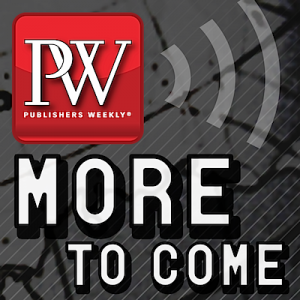 Brought to you by Publishers Weekly, it’s More To Come, the weekly podcast of comics news, interviews and discussion with Calvin Reid, Kate Fitzsimons and The Beat’s own Heidi MacDonald.
Brought to you by Publishers Weekly, it’s More To Come, the weekly podcast of comics news, interviews and discussion with Calvin Reid, Kate Fitzsimons and The Beat’s own Heidi MacDonald.
In this week’s podcast, the More to Come crew discuss Charlie Hebdo, the attack on its offices and its cultural context as well as comics publisher IDW purchasing Top Shelf, Reed Pop buying Emerald City Comic Con and much more on PW Comics World’s More To Come.
Download this episode direct here, listen to it in streaming here and catch up with our previous podcasts on the Publishers Weekly website, or subscribe to More To Come on iTunes
Blog: PW -The Beat (Login to Add to MyJacketFlap)
JacketFlap tags: Conventions, Videos, video, Podcasts and other media, National Book Festival, book festivals, Comics, Add a tag
 Back during Labor Day weekend, the Library of Congress hosted the 14th annual National Book Festival at the Washington Convention Center. We posted the notice here, showcasing all of the amazing graphic novel programming, but now the Library of Congress has posted videos from most of the sessions!
Back during Labor Day weekend, the Library of Congress hosted the 14th annual National Book Festival at the Washington Convention Center. We posted the notice here, showcasing all of the amazing graphic novel programming, but now the Library of Congress has posted videos from most of the sessions!
Click on the red titles to go to the event page, where one can read a synopsis, transcript, and watch the video if the embedded images do not work.
Full list of all author videos
Author’s Gala: Book Fest 14
Gene Luen Yang’s speech is at 19:30, but I recommend watching the entire video!
Liza Donnelly: Book Fest 14
Bryan Lee O’Malley: Book Fest 14
Bob Staake: Book Fest 14
Jeffrey Brown : Book Fest 14
Gene Luen Yang: Book Fest 14 (Graphic Novels)
Gene Luen Yang: Book Fest 14 (Teens)
Vivek Tiwary: Book Fest 14
Raina Telgemeier: Book Fest 14
Jeff Smith: Book Fest 14
Brian Biggs: Book Fest 14
Lewis & Aydin: Book Fest 14
“Rep. John Lewis and Andrew Aydin appear at the 2014 Library of Congress National Book Festival in Washington, D.C.”
Blog: PW -The Beat (Login to Add to MyJacketFlap)
JacketFlap tags: Podcasts and other media, Top News, more to come podcast, Add a tag
 Recorded at Publishers Weekly, it’s More To Come, the weekly podcast of comics news, interviews and discussion with Calvin Reid, Kate Fitzsimons and The Beat’s own Heidi MacDonald.
Recorded at Publishers Weekly, it’s More To Come, the weekly podcast of comics news, interviews and discussion with Calvin Reid, Kate Fitzsimons and The Beat’s own Heidi MacDonald.
Recorded live at Comic Arts Brooklyn, in this week’s podcast More to Come’s Calvin Reid interviews Jen Wang, co-creator of “In Real Life” with Cory Doctorow as well as the webcomic Strings of Fate; Belgian cartoonist Oliver Schrauwen, creator of Fantagraphics’s Arsene Schrauwen, a surreal fictional biography of his grandfather set in the then Belgian Congo; and Tim Lane, creator of the new Fantagraphics graphic novel The Lonesome Go as well as Abandoned Cars on PW Comics World’s More To Come.
Download this episode direct here, listen to it in streaming here and catch up with our previous podcasts on the Publishers Weekly website, or subscribe to More To Come on iTunes
Blog: PW -The Beat (Login to Add to MyJacketFlap)
JacketFlap tags: Interview, podcast, Interviews, Comics, Indies, Conventions, Podcasts and other media, Disney, don rosa, SDCC, Eleanor Davis, Lucy Knisley, Archie Comics, Alex Segura, Top News, Life with Archie, more to come podcast, SDCC '14, afterlife with archie, Death of Archie, Add a tag
 Live from San Diego Comic Con, it’s More To Come! Publishers Weekly’s podcast of comics news, interviews and discussion with Calvin Reid, Kate Fitzsimons and The Beat’s own Heidi MacDonald.
Live from San Diego Comic Con, it’s More To Come! Publishers Weekly’s podcast of comics news, interviews and discussion with Calvin Reid, Kate Fitzsimons and The Beat’s own Heidi MacDonald.
In part two of More To Come’s San Diego Comic-Con special, Calvin Reid talks to Don Rosa about Scrooge McDuck, European fans and Carl Barks; Eleanor Davis on her new book How to Be Happy; and Lucy Knisley about her new book An Age of License. Meanwhile, Heidi MacDonald interviews Archie Comics President Mike Pellerito and sr. v-p Alex Segura about Life With Archie, dead Archie and zombie Archie. All this and more from Publishers Weekly’s More To Come!
Listen to this episode in streaming here, download it direct here and catch up with our previous podcasts on the PublishersWeekly website, or subscribe to More To Come on iTunes
Blog: PW -The Beat (Login to Add to MyJacketFlap)
JacketFlap tags: Interviews, Podcasts and other media, Podcasts, Top News, Crowdfunding, Patreon, Graeme McMillan, Jeff Lester, Add a tag
150 episodes in, and the Wait, What? podcast is undertaking a huge shift. No, it’s not relaunching, although it is spinning off in a whole new direction, and nothing will ever be the same again.
Why? Well, because hosts Jeff Lester and Graeme McMillan, who have spent the last few years dissecting and reviewing all kinds of comics on a fortnightly basis, are moving the site to a base of its own, and running it under their own steam. Formerly hosted by the Savage Critics website, Wait What will now be hosted on its own website, run by the pair.
Alongside the move, the pair have set up a Patreon in support of their podcast, which you can see here. The Patreon, which I’d suggest is one of the first times that comic critics have established a crowdfunding page of their own, has been a tremendous success thus far. They’ve hit several of their target goals, meaning that on top of the fortnightly podcast they will also be writing reviews for their site, and populating it with content.
Considering that both are established writers in their own right – Lester has written extensively for Savage Critics, whilst McMillan writes for Wired, Time, The Hollywood Reporter and more – that’s pretty good news. And on top of everything else? The podcast is teaming up with Oily Comics for a giveaway which is going on RIGHT NOW.
To find out more about all their plans, I spoke to them both about how the podcast got started, how it runs, and what we can expect in future months.
Steve: How did you two meet, to begin with?
Graeme: We met because I ripped Jeff off. That’s maybe not completely true — Jeff and I both knew Brian Hibbs, who owns San Francisco’s Comix Experience store and we’ve both worked for him at various times in our lives — but when I created the Fanboy Rampage!!! blog those many years ago, I subconsciously ripped the name off from the monthly column Jeff wrote for the Comix Experience newsletter.
It was so subconscious that, when Jeff got in touch to politely ask if I’d done it, my first response was “Of course I didn’t, what are you talking about?” It was my first experience with riding on Jeff’s coattails, but not my last.
Jeff: Mine is the Fanboy Rampage of Earth Two: technically, it came first, but it’s mostly a footnote to Graeme’s. I’m just glad I get to team up with him more frequently than once a year and I don’t have to have the rest of the JSA in tow.
Steve: When did the idea for Wait, What come about? Were you aware of other comic podcasts around, and wanted to get involved yourselves?
Graeme: The short version is, we wanted an excuse to talk comic stuff to each other. I was definitely aware of other comic podcasts, but not that many. We started five years ago, and I want to say I was only really aware of something like Word Balloon at the time? Definitely nothing as conversational or, for that matter, honest as what Wait, What? is.
Jeff: We actually owe a debt of gratitude to David Brothers, who as I recall shamed Graeme into finally buying the headset so we could actually start recording. And David’s 4th Letter podcast with Gavin Jasper and Esther Inglis-Arkell, along with Funnybook Babylon, were the first real podcasts I checked out. But Graeme was way more aware of other comic podcasts than I am—between having a really short commute and an inability to multitask, I can’t keep up—and that’s pretty much been the case ever since.
Steve: How did you develop the style of the show? Was the interest always in having a show which could run at length, and talk about any aspect of comics you wanted?
Graeme: The style of the show developed… unintentionally? I think that’s fair to say. When it first started, it was far more organized and compact than it’s become. We used to edit the longer conversations into shorter episodes, so that one session might make two or three episodes, but there was something about that that felt very artificial, and arbitrary — and also problematic, when we’d refer back to things that we’d said earlier that conversation, but two episodes back to the listener. It’s been a slow evolution, and one that’s reflected our learning curve as podcasters.
Jeff: We were very lucky to get feedback early on from listeners, and enough of them preferred the more organic approach of a longer conversation. It gave us the courage to really commit to that approach. Sometimes I worry it makes it difficult for new listeners to start listening to us—it seems like it’s asking for a big commitment up-front, but we have dedicated listeners who occasionally say things like, “man, if you just did three hours every other week, that’d be perfect!” And I think Graeme and I enjoy the freedom now, even if it still makes us feel “unprofessional.”
Steve: Being a completely visual medium, you’d think comics wouldn’t translate well to podcasts. Was it difficult, especially to begin with, to find ways to talk about them?
Graeme: It’s still difficult. We’re still guilty of concentrating more on the writing than the art, although having the website to post images/artwork when we’re commenting on a panel or sequence in particular has been a great help. I was going to say, it’s no different from writing about art, but that’s not true: depending on where you’re writing for, there’s the chance to feature the images RIGHT THERE beside the text, so it’s immediately put in context. You can’t do that on a podcast (or, at least, an audio podcast).
Jeff: Unfortunately, talking about the visual elements in comics and the artist’s role as a creator in Big Two bullpen-style comics is something a lot of comics criticism on the web has been kinda terrible at? Speaking for myself, that comes from having learned from my literature classes to talk—in a rudimentary way, at least—about what the writing and storytelling might be doing, but having far fewer tools for talking about, I dunno, what the artist is achieving by using a foreshortened perspective.
I think the podcast makes it easier for me to talk about the visual elements because I can do so conversationally, imprecisely, in a way I’d be too self-conscious to do in print. And it helps that Graeme will either help me out when I’m not making sense, or mock me for his own amusement. It’s a win-win situation…at least for him.
Steve: Do you think that the podcast has improved your ability to talk and analyse comics in general?
Graeme: Talking to Jeff has, more than doing the podcast, if that makes sense? He approaches things in a way that I just don’t, and it’s helped me appreciate what I’ve been reading more, and also question my assumptions on any given text.
Jeff: Yeah, I’d agree with that. Definitely. Although I think the standards are changing overall about how to talk about comics—there’s been a real push from online writers to change things up, and I think that’s helped me a lot as well.
Steve: How has the podcast developed over the years? Do you think you’ve changed as time has gone on – moved away from certain companies, moved towards certain kinds of stories, and so on?
Graeme: To an extent? As I said earlier, we started doing shorter episodes that were segments of longer conversations, and now listeners generally get the longer conversations more or less complete. Part of that’s being more comfortable doing what we do, but there’s also an element of us just KNOWING what we’re doing more now. There’s also been a bit of making mistake and then learning from them, too. I’ve said things in the past — reading into creators’ intentions, especially — that I try not to do now (Note the “try” — I still forget myself occasionally).
Jeff: I went through a couple years there where I refused to support Marvel financially, and I was worried that might modify the tenor of our conversations or what we could talk about and stay interesting. But it didn’t change things as much as I thought.
What has changed, since we started doing the podcast, is how digital has really grown as a market, and libraries carrying more graphic novels and collections than ever. I think those two factors have influenced the podcast tremendously, as it’s easier for me to stumble across material I might have missed, or to revisit material I had no interest in until it was ninety-nine cents an issue. I never would’ve ended up talking about Daddy Cool, for example, or what a thematically unified statement The Boys is for Garth Ennis, if I wasn’t able to supplement my staid comic book shop purchases with more experimentation.
Steve: A recent feature which has taken over a good hour of discussion each episode is your run-through of the Avengers books – starting right with issue #1 and tackling ten or so issues at a time. What made you want to go back and start reading and reviewing those books?
Graeme: I honestly don’t remember. I think it just seemed like a good idea at the time, and sounded like it’d be something fun and different for us to do? Jeff?
Jeff: Graeme doesn’t remember because it was his brilliant idea! I’d bought those amazing GT Corp. DVDs off eBay that contain 600 issues at a go of specific Marvel characters—Fantastic Four, Spider-Man, and The Avengers—and I’d been moaning about how I hadn’t made any time to read them. And since Graeme also had the Avengers DVD, he said, “If we make it part of the podcast, you’ll have to read them!” And he was right. (Thank God we’re only reading the first 300 issues, though.)
Steve: Has that changed your view of the characters, or the series as a whole? Do you have a new favourite Avenger, for example?
Graeme: Not so much a new favorite Avenger — I think that’ll always be a tie between the Beast, Hawkeye or the Wasp depending on who’s writing at the time — but it was an eye-opener to go back and realize how bad the Lee/Kirby issues actually are. You think of the two working on Thor and Fantastic Four, and they’re capable of such amazing stuff, and their Avengers just doesn’t work. It’s kind of surprising how long it is until the series DOES work, to be honest — and just how quickly it all comes together when everything falls into place.
Jeff: I ended up loving The Wasp during the Stan Lee and Roy Thomas years: they both wrote her as kind of flighty (pun intended, probably) and with more than a little condescension, but she was the only one who seemed to be having anything like fun…or resembled anything like an actual human being.
Steve: Are there any types of comic you wished you spent more time on – you tend to talk about any comic you want, without a particularly heavy DC/Marvel/Image bias. But are there any comics you wish you could discuss in more detail?
Graeme: I think we talk about what we “want to” talk about — as evidenced by the amount of time we spend on 2000AD on a regular basis, or Top Shelf’s Double Barrel when that was coming out. There’re certainly comics I wish I knew more about so I could talk about them more, if that doesn’t sound too odd. I should be reading and talking about more Fantagraphics books, you know? Or Drawn & Quarterly, Nobrow, SelfMadeHero, and so on. I need to get outside of my Direct Market comfort zone more.
Jeff: Man, it can be hard to follow Graeme McMillan without just saying “Ditto!” and “What Graeme said!” after everything. As for what we cover…when the only limitations are our imaginations and our budgets, it’s not long before you get really frustrated with both.
Steve: Wait, What is particularly notable because you’re “candid”. Or, to put it another way, you don’t pretend that books are good just because everybody else says so. Do you think the ‘of the moment’ nature of podcasting allows you to offer a more honest review of comics than sitting down to write a review? Once something’s been said, you can’t so easily press the delete button?
Graeme: Yes, for better and worse. There are times I would love to take something back, but there’s a lot to be said for the immediacy of the whole thing, and the way in which it gets past a lot of the inner editor for the good, as well. Plus, having someone like Jeff to bounce half-formed ideas off, knowing that there’s something about the conversational format that gives you license to be just outright wrong is pretty great, too.
Jeff: For me, this is really where Brian Hibbs’ influence shines through: I started writing reviews for comics over at the Savage Critic website and I followed his lead in never being afraid to say what I thought. So I don’t think the “of the moment” nature of podcasting affects me, at least in that regard.
What’s great is that Graeme can point out my biases, suggest alternative readings, or just flat-out call me on my shit. Also great is that the organic nature of our podcast means I can revisit a work and talk about if my opinions change, and why. That’s an aspect of criticism that gets overlooked in the written medium—the idea that these works are part of our lives and as we age and the culture ages, what they mean to us can change.
I guess it’s easier to address how art is an ongoing conversation between the work and the beholder when you’re having a literal ongoing conversation with someone?
Steve: Do you think there can be a tendency to offer better reviews to creators you like as people, or to find conflicts of interest start to influence your discussions? Graeme, you’re always quick to let people know if you received a review copy of the books you talk about, before you talk about them.
Graeme: Am I? That’s maybe self-consciousness, rather than any intentional idea of what I should do in the name of transparency. I think there’s definitely a tendency to find yourself biased when you’ve received something for free, or know the people involved — more than once, we’ve talked about a particular comic being good for something we didn’t pay for, but not worth the official price, or something similar.
It definitely feeds into not only what you say publicly about a work, but also how you read it — but then, so does whatever mood you’re in when you read something. I’ve been incredibly guilty of writing something off when I read it the first time, then going back and having an entirely different experience when I revisit it. There’s a lot that’s in there beyond the objectivity we’re always supposed to show when we’re reviewing something.
Jeff: Damn it, Graeme! “Ditto.”
Steve: You’ve taken the podcast to Patreon and gone independent, moving away from the Savage Critics website. Was this because you wanted to take more ownership of the show?
Graeme: Yeah, and also because we wanted to do more with the show — and also see if the show could give something back to us in terms of the amount of work involved.
Jeff: To be clear, Brian was always incredibly supportive of everything we did and never put any kind of restrictions on our content or anything…but he’s also a busy guy with a lot of irons in the fire. Sometimes we couldn’t change things as fast as we’d like or feel like we could experiment easily. Or a lot of times the site would be content-light and then all of a sudden everyone would contribute at once, and I’d feel like we were stepping on toes.
Paring it down to just us—as tough a decision as that was, because I think Graeme and I are both really loyal—seemed like it would be the best way to figure out what we could do, and if people were willing to support us doing it.
Steve: What were your goals with the Patreon? What did you want to use the funds for, and have you been surprised by the response?
Graeme: The goals have always veered wildly between our natural pessimism (“It’ll be great if anyone even notices us”) and wild optimism and ego (“And then, when we’re making thousands of dollars every month!”). Realistically, we wanted to see if there was some way we could use the show as the basis for something more ambitious, which we also owned and controlled. We’ve been very, very surprised by the response. It’s way beyond what either of us were realistically thinking would happen.
Jeff: ARGHHHH. “What Graeme said.”
Steve: You’re one of the first high-profile ‘comics media’ places to take to Patreon, although I’m aware several other sites will be trying it soon. Do you think this is where comics criticism has to go, now? Fewer and fewer places are paying for digital content now.
Graeme: I’m not sure if this is where it HAS to go — I got started doing this for myself, for nothing, just to get it out there, after all, and that’s as valid an aim as ever — but it’s certainly one of the directions it can go in, especially if you’re looking to do this as a way to earn money (or even just break even from the cost of buying all those comics in the first place).
The future of paid online journalism is all over the place right now — not in terms of comic stuff, although if you think about what’s happened to Comics Alliance, iFanboy, MTV Geek and other sites over the last couple of years, that’s obviously in flux as well — but in general, there’s a lot of change and turmoil right now. No-one’s worked out what “the model” for this as a business really is, yet, and they’re still trying.
The last six months have been crazy, as someone who works in this field, and I doubt it’s going to get any less turbulent any time soon.
Art by Julia Gfrörer
Jeff : I’m super hand-wringy about the state of comics criticism: I think people can only write it for so long as a labor of love before they move on to something else, because they have to eat or the pain of feeling like such a small fish in an even smaller pond gets to them.
And although I think there’s a very good case to be made that there may not be anything to write critically about comic books that weren’t written in the first hundred issues of The Comics Journal, I feel like the two biggest impediments to comics being considered the important medium they obviously are has been an inability to keep books in print long enough to become “canon,” and our inability to have someone professionally writing about comics over the decades—without both of those things, I think every generation ends up having to re-create the wheel.
We’re finally in a situation where a canon is accumulating, and access to that canon is easier than ever. And we have Understanding Comics, and writers like Heidi and Tom Spurgeon who’ve been covering things for a stretch of time now. But I think it’s super-important to find ways for the next generation of comic critics—the people who are out there now—to get paid, and paid enough so they can think, “well, I can make a living at this—a bad living, but a living—and I really care about the art form, so maybe I should give this a shot.”
Steve: What sorts of rewards are you offering?
Jeff: Since everyone who is reading this is on the Internet already, I invite you to go to http://patreon.com/waitwhatpodcast and see!
Steve: You’ve already hit several milestones for the Patreon, and will now be writing content as well as recording the podcast. Is this your ideal for the future? That Wait, What spins into a whole, affordable website of its own?
Graeme: In a perfect world, yes. Quite how workable that would be in practice remains to be seen, of course…
Jeff: Yeah, that is totally my crazy dream: that enough people will believe in us and between that and the content we’re generating, we can get enough traffic to make something like a full-fledged comics website, one that doesn’t have to rely on exclusive previews or softball coverage. We have a few of those sites. We need more.
Also—and I know he’ll hate me for saying this—but Graeme McMillan is one of the smartest, most knowledgeable writers about both the business and artistic sides of the comics industry currently working, and I know he’s also a hell of a good editor. Who doesn’t want to see what he could build if he had the funds and the support to do so?
Steve: Does this mean, ultimately, that you’re now rivals with The Beat?
Graeme: Sure, why not. (I mean, no, not really; we don’t do a fraction of what the Beat does in reality, but professional feuds are meant to be good, right? Hey, Steve! Pixie sucks! YOU HEARD ME.)
Steve: Graeme, you are BANNED from The Beat as soon as I ask this one final thing: Where can people find you online? What are you up to at the moment?
Graeme: The podcast can be found here, and it’s on Twitter here (individually, we’re also on there as @graemem and @lazybastid). Right now, I’m typing this between deadlines for the Hollywood Reporter’s Heat Vision blog, where I post every weekday, and Wired.com’s entertainment vertical, because I clearly have a lot to say on the Internet.
Jeff: And I just got back from walking on the beach!
-
Many thanks to Jeff Lester for his time! And NO THANKS AT ALL TO GRAEME for his harsh and inaccurate and wrong and WRONG opinions regarding Pixie. You are now officially banned from The Beat, grr.
On top of the links above, you can find the new Patreon site for Wait What over here. I’m pledging myself! You’re in good company if you choose to as well.
Blog: PW -The Beat (Login to Add to MyJacketFlap)
JacketFlap tags: Top News, tcaf 2014, Cartoonists, Podcasts and other media, Add a tag
Jamie Coville has done his usual amazing job of recording panels from TCAF, including several from the librarian and educator conference, Trina Robbins talk on Nell Brinkley, and the Doug Wright Awards. He also has photos up here and here.
Toronto Comics Arts Festival (TCAF) 2014 (May 9 – 11) – 210 Photos
Note: Friday May 9th was Librarian & Educator day. For the general public TCAF was May 10-11th.
http://www.thecomicbooks.com/pics/index.php/Toronto/TCAF/TCAF-2014
The Brinkley Girls, WWI and American Patriotism in Women’s Comics: A talk by Trina Robbins. (38:58, 35.6mb)
The Introduction is by Dr. Barbara Postema. Trina talked about Nell Brinkley with a big touch screen TV (which she liked). She also talked about Nell’s work, what it was saying, ran through some highlights
of some stories she told with her art and talked about her politics and humour, among other aspects. Trina then answered a variety of question about Nell, rediscovering her, why traditional comics history
don’t touch on female cartoonists and Nell’s original art.
Great Creator Visits! (50:05, 45.8mb)
Moderated by Scott Robins, this panel featured Lynn Johnston and Raina Telgemeier talking about their visits to schools and libraries. Lynn opened up about not liking to do schools where the kids are
forced to be there. She said they can be disruptive, a lot like she was at that age. She prefers events where those in attendance want to be there. Raina talked about having to deal with rowdy kids.
Lynn said she doesn’t like overly long introductions because they drain the energy of the room. They gave a list of don’t for events and among them were staff not aware of the event, no
advertising, not being able to sell their books after the show, no bathroom or coffee breaks between events and friends of the organizer wanting to dominate your time after the show. They also talked about
good creator visits they did. Both of them spoke about the struggle to make deadlines while doing visits, the age level they prefer talking to, doing visits on Skype and interviews via twitter. The
audience asked questions about their gay characters and what response they got from them. Lynn also talked about her decision to age the characters as the strip went on and how that affected merchandising.
Lynn said she really liked Rania’s book Smile and gave Rania a big public stamp of approval for her work as a cartoonist.
Collection Maintenance. (1:05:38, 60.1mb)
On the panel was Robin Brenner, Scott Robins and Max Dionisio. It was moderated by Lindsay Gibb. They started by talking about their libraries, what they carry and what moves really well. Each
gave which websites they follow for keeping up with comic news. The method in which they house their collection was discussed. They spoke about how they handle Manga and buying series (full series or the
first few volumes). They talked about weeding out books that just don’t circulate, something they all have to do. They discussed how to avoid pigeon holding their Libraries collection. Max talked about his
unique situation in an all-boys school in handling GLBT books. He finds them scattered around the library all the time so he knows they are being read, but they don’t get taken out because kids are afraid of
outing themselves or just getting teased/bullied when others see their name on the Library card. They also discussed how digital access to comics has affected their circulation.
Comics and Undergrads. (53:33, 49mb)
Moderated by Lindsay Gibb, the panellists where Marta Chudolinska, Dr. Dale Jacobs and Dr. Barbara Postema. They started off talking about how they got involved in comics and how it relates to their current
academic work. They discussed what they like about comics, specific books they use in their teachings, how wordless comics are good for education, assignments they use comics to teach, how much they use
their library for their lessons, if they got any pushback to their work and how some of the theory between comics and picture books have a lot of overlap. Barbara mentioned that sometimes wordless comics get
called picture books. Marta talked about how the Library she works for tries to provide access to things that is out of reach for many people due to cost or scarcity, like artists editions books and comics
criticism.
2014 Book Talk: Kids. (34:36, 31.6mb)
Andrew Woodrow-Butcher spoke about some upcoming kids books that would be good for libraries. Among the books he mentioned were the new Amulet Vol 6, Cleopatra in Space, Salem Hyde, Star Wars Jedi Academy,
the Hilda series, Zita the Spacegirl, Jellaby (now back in print), A Cat Named Tim, Cat Dad King of the Goblins, new Amelia Rules books, The Dumbest Idea Ever, a new Battling Boy book, Anna and Froga,
Courtney Crumrin Vol 5, a new Lego book, A Regular Show book, a bigger, full colour reprinting of Dragon Ball Z, the Marvel Digests, itty bitty Hellboy and Aw Yeah Comics, Samurai Jack, Power Lunch, the
Sonic the Hedgehog and Megaman crossover book, Mermin, Dinosaurs, The Kings Dragon, Hidden, Gajin, Maddy Kettle, new Adventure Time books and WWE collections of their comics. Within the panel was Kazu
Kibuishi talking about Amulet and it’s evolution. Kazu also revealed his serious health problems prior to doing the book where he got so sick he went into a coma. John Martz talked about a Cat Named Tim and
Jim Zub talked about Samurai Jack going from a mini-series to ongoing.
Note: I cut out about 4 minutes from the audio where they do a door prize giveaway.
In Conversation: Kate Beaton and Lynn Johnston. (1:11:11, 65.1mb)
This was moderated by Raina Telgemeier. Chris Butcher started the evening off with small talk about TCAF and how they try to be inclusive of all genders and show a diversity of people from different
backgrounds. He mentioned this year they are getting international press coverage and have artists from 20 different countries this year, which he’s really happy about. He made a sly Rob Ford joke about
being sorry he named it the Toronto Comics Art Festival. Chris also thanked their sponsors of the show as well. Rania asked a variety of questions and they started with how the two of them got started in
comics. Lynn talked about her and Jim Davis (of Garfield fame) starting out at the same time. Throughout the show she talked about her previous jobs working in animation and a medical artist. Kate talked
about starting her web comic at a fortunate time when there was a lot less competition for people’s attention on the internet. The two talked about their role models and particularly female role models.
Kate said Lynn was one for her. Raina mentioned that Lynn was the first female and Canadian winner of the Reuben Award and asked her what that was like. Lynn said it was very stressful because at the time
some people wanted Jim Davis to win (and some didn’t) and she felt she was too young and hadn’t really done anything yet to deserve the award at the time. In particular she mentioned a lot of MAD artists
(like Mort Drucker) who hadn’t won the award yet and should have gotten it before her. She also told a funny story about how she handled other cartoonists when she was president of the Cartoonists Society.
The two talked about criticism from men. Family was a topic with how far you go, if they regret putting something out there and if they felt later that they overshared information. They talked about how fans
shared personal stories with them. This lead into Lynn talking about the outing of a gay character in For Better Or For Worse and the reaction she got from readers and newspapers. She thinks it was the best
story she did and the one she’s the most proud of. They talked about their efforts to help out young artists. Lynn mentioned how when she has something personally bad happen to her she’s thinks it will be
turned into a great story. Rania asked if they still love comics as much now as they did when starting out. Kate said she still does. Lynn talked about how her father loved the comics and comedy in general
and would read comics to her, point out the details in them, and would run films back and forth to show how it was all choreographed. Lynn also revealed she loves comedians and wanted to be one. Rania asked
what keeps them coming back to the drawing board. She also asked each of them what she is doing now. They also took some questions from the audience. Lynn said she really enjoyed working on the animated
For Better Or For Worse cartoon, said it was great working with all those people doing different things (music, artists, sound effects, etc..). She also revealed from working on the cartoon she drew her
strip with more detail as the animators needed detailed everything about her strip in order to make the cartoon. Kate talked about her growing up in small town and being like the only artist there.
Ed Brubaker and Sean Phillips Spotlight. (55:48, 51mb)
Heidi MacDonald moderated this panel. They started off with how the two ended up working together and in particular how Sleeper came about. Ed was very outspoken during the panel, saying he wished he had retained ownership of it. Sean talked about his art and where digital is used to create it. The two spoke about their process of working together today. They revealed they hadn’t seen each other in person in 5 years, but e-mailed each other daily. Ed said that he signed on to work with Marvel to publish through their Icon imprint. He also said the imprint was started for Bendis but they brought on David Mack’s book so it didn’t appear that way. He revealed that he got just got the rights back to Criminal a week ago and will be moving the series over to Image. He said that Icon was a imprint that was used as a favour to people who did their superhero books and didn’t want his career to be at the mercy of favours from other people. He also revealed that Dan Buckley had to justify Icon to the shareholders as Marvel doesn’t make much money from it. Ed said for a while he was paying creators out of pocket for a while on Criminal. Regarding his writing, Ed likes adding subtext in his stories so people get a lot out of it and it’s not a quick read. He wants people to get something new out of the story when it gets re-read. Ed expressed appreciation for something Sean does that he sees no other penciler do is actually write in where the lettering would go to ensure that there is room there for the word balloon. So many other artists don’t do that, which leaves not enough room for the dialogue and that leads to production issues. They also went over how Sean doesn’t do splash pages very often. Ed brought up the “Archie” story within Criminal and what he was reacting too when he wrote it. He revealed he’s been talking to Joe Hill about horror and wants to delve into that. Ed discussed the reason he does crime stories because when he was on the wrong side of the law in his youth, involved in shoplifting, doing and selling drugs to
other kids in his school and he likes the stories about the desperation of committing a crime and the twisted version of the American Dream. Ed revealed there is a new book coming about the 1940s+ Hollywood
with blacklists, the studio system and other issues. He said he had family that was working in Hollywood at the time and he wants to incorporate that information into the book.
Michael DeForge and Friends. (55:15, 50.5mb)
On the panel were Jillian Tamaki, Annie Koyama, Patrick Kyle, Michael DeForge and Ryan Sands. The creators (everybody but Annie) are involved in Youth
in Decline. They revealed there is a Lose collection coming about that collects issues #2 to #5. Michael said #1 does not fit in with the rest of the stories so he’s not putting it into this
book. The group talked about how and what they choose to put online vs. what’s for print. They talked about collaborating with others and how they handle differences of opinion. Doing anthologies and their
growing popularity, Jillian also asked questions to Michael and kind of co-moderated the panel. Annie revealed she has seen creators online that she was interested in publishing, but there was no contact info
for the creator so she moved on. Michael was credited as being a good writer by Jillian and wondered if the change in his drawing style has affected how he writes stories. They talked about a new book that
is coming out, took questions from the audience, and talked quite a bit about the need for validation among their peers. They also talked about needing a trusted another set of eyes to look at their work and
give feedback prior to publication.
Trina Robbins Spotlight. (57:44, 52.8mb)
During this panel Trina went though some parts of Pretty in Ink, her final book about female comic artists. She went through some of the earliest comic artists, starting with the first comic strip drawn by a
female and ending with the Women Comix anthology and a photo of the 40th reunion of the Women Comix anthology. After that Johanna Draper Carlson interviewed her about why she did the new book. She had
revealed she was very unhappy with her last book due to all the typos. She was really unhappy with her editor on that book and was not shy in saying so. Gary Groth of Fantagraphics asked her to do
this book and she had a lot of new information and wanted to correct some bad information in her previous books. She said Gary worked with her to make sure there wasn’t a single typo in this book. The
audience also asked questions and she revealed that she would love to write Wonder Woman but DC would never hire her. She also felt that DC/Marvel female editors did not support female creators, but would
say they did in order to sell that there was no sexism in comics – in order to keep their jobs.
History/Nonfiction Comics. (58:33, 53.6mb)
This panel was moderated by Brigid Alverson. On the panel was Nick Bertozzi, Nick Abadzis, Diana Tamblyn, Nate Powell, Meags Fitzgerald and Tyrell Cannon. The group talked about why they choose to do
Nonfiction works, how doing it helps them as creators, how they deal with the facts getting in the way of telling a good story, the visual research and how important it is, if the subject is still alive and
do they reach out to them, if they worry about their audience reaction to the book, how they deal with direct quotes when it doesn’t work with the script.
Ed Brubaker: Writing Comics Noir. (55:22, 50.6mb)
Andrew Murray and Adam Hines from Guys with Pencils podcast moderated the panel. Ed talked about how he got involved with Noir as a child. He also talked
about his past, saying one story from Lowlife was actually autobiography. He revealed that his parents worked in the Navy and when he was young he lived in Guantanamo Bay for a couple of years. He explained
what Noir means to him and if he thought Noir characters had to be bad people. He discussed what TV shows he likes (or liked), mentioning the Sopranos and a Canadian show called Intelligence that he said was
cancelled because of politics, specifically citing Prime Minister Stephen Harper as being the reason. Ed said his uncle was a CIA operative that was outed in the 70s (presumably in Inside the Company:
CIA Diary book). The Captain America: The Winter Soldier movie came up and he said what it was like being an extra on it and being happy it was a good film. Ed mentioned that he spends half his time writing
TVs and movie screenplays, saying he wrote a remake of Maniac Cop. Regarding Criminal, they are now hiring cast for it. There were questions from the audience and he told us who inspires him today to be a
better writer.
Stuart Immonen and Sean Phillips in Conversation. (1:01:10, 56.0mb)
While the two talked there was a slide show of art going on in the background which sometimes came up in the conversation. They started off with some very early work and how they got published. Sean talked
about inking, painting covers, photo-referencing & design. Stuart talked about using 3D models; both said they looked at other peoples sketchbooks to keep with what younger artists are doing. They discussed
the tools they used to make art with, they showed some work outside of comics that Sean did and got into page/panel design. This brought out questions from Ed Brubaker who was in the audience,
asking about the grid design used in their books (which got some laughs from the audience). Stuart talked about doing digital comics in that the entire thing was designed to be read on a tablet or phone,
and the amount of re-thinking about the effects of reading comics this way that it took, both in terms of the size of the screen and the non-traditional gutter space. There were other creators in the audience
that also began talking about contributing to digital comics (the panel became a round table discussion for a couple of minutes), Sean talked about a job he had to turn down, Stuart talked about a small
Pirates of the Caribbean story that he did in a completely different style and how it lead to the work he did on Nextwave.
The Doug Wright Awards 2014 (May 10) – 26 Photos
The Doug Wright Awards 2014. (1:20:18, 73.5mb)
The ceremony went as follows:
Introduction of the nominee’s and sponsor appreciation by Brad Mackay.
Doug Wright’s youngest son Ken Wright spoke on behalf of the family.
Opening monologue by Scott Thompson.
Pigskin Peters Hat/Award: Emily Carroll for Out of Skin.
Jeet Heer explains why the jury chose Carol’s work.
Don McKellar (minus 1 tooth) read the nominee’s for the Spotlight Award.
Spotlight Award (AKA “The Nipper”): Steven Gilbert for The Journal of the Main Street Secret Lodge.
Nick Maandag explains why the Jury picked Gilbert’s book.
Michael Hirsh gave his history in recovering and preserving the archives of the Canadian Whites.
Induction of all 200+ creators of the Canadian Whites into the Giants of the North Hall of Fame.
The last two surviving cartoonists Gerry Lazare and Jack Tramblay were there and gave their acceptance speech. They were followed by Adrian Dingles youngest son Christpher.
Best Book: Paul Joins the Scouts, Michel Rabagliati (Conundrum Press).
Closing by Brad Mackay.
Then Hope Nichols and Rachel Riley talk about the just published Nelvana of the North (created by Adrian Dingle) Collection.
Blog: PW -The Beat (Login to Add to MyJacketFlap)
JacketFlap tags: Top News, Justin Jordan, more to come podcast, Rico Renzi, Interviews, Podcasts and other media, Podcasts, Brian Stelfreeze, Add a tag
Straight from the offices of Publishers Weekly, it’s More to Come! Your podcast source of comics news and discussion starring The Beat’s own Heidi MacDonald.
In this week’s interview special, Heidi goes to Mid-Georgia Con in Macon, Georgia and interviews comics creator Justin Jordan of The Strange Talent of Luther Strode and Shadowman, Rico Renzi – creative director of Heroes Con and successful comics colorist, and veteran comics artist Brian Stelfreeze, currently working on the new Boom comic Day Men on PW Comics World’s More To Come podcast.
Listen to this episode in streaming here, download it direct here and catch up with our previous podcasts on the PublishersWeekly website, or subscribe to More To Come on iTunes
Blog: PW -The Beat (Login to Add to MyJacketFlap)
JacketFlap tags: Top News, more to come podcast, eric stephenson, comicwalker, podcast, Manga, Podcasts and other media, Podcasts, Add a tag
Straight from the offices of Publishers Weekly, it’s More to Come! Your podcast source of comics news and discussion starring The Beat’s own Heidi MacDonald.
In this week’s podcast the More to Come Crew – Heidi “The Beat” MacDonald, Calvin Reid and Kate Fitzsimons – discuss Image publisher Eric Stephenson‘s controversial speech at ComicsPRO, ComicWalker, Kadokawa’s new digital manga venture, Kickstarter hits $1 billion in pledges, Steve Ditko on Kickstarter and comics marketing from fun packs to cereal boxes and more on PW Comics World’s More To Come.
Now tune in Fridays for our regularly scheduled podcast!
Listen to this episode in streaming here, download it direct here and catch up with our previous podcasts on the PublishersWeekly website, or subscribe to More To Come on iTunes
Blog: PW -The Beat (Login to Add to MyJacketFlap)
JacketFlap tags: podcast, Interviews, Comics, Cartoonists, Indies, Podcasts and other media, Podcasts, Dean Haspiel, Indie Comics, more to come podcast, Add a tag
Straight from the offices of Publishers Weekly, it’s More to Come! Your podcast source of comics news and discussion starring The Beat’s own Heidi MacDonald.
In this week’s interview special, Publisher’s Weekly’s Calvin Reid interviews indie comics master Dean Haspiel about his beginnings as well as his latest work, including The Fox from Archie Comics and Fear, My Dear: A Billy Dogma Experience from new publisher Z2 Comics. Haspiel, known for his work on such books as “The Quitter” with Harvey Pekar and “The Alcoholic” with Jonathan Ames is also a co-founder of the web comics collective Act-I-Vate. All that and more on PW Comics World’s More To Come podcast.
Listen to this episode in streaming here, download it direct here and catch up with our previous podcasts on the PublishersWeekly website, or subscribe to More To Come on iTunes
Blog: PW -The Beat (Login to Add to MyJacketFlap)
JacketFlap tags: podcast, Marvel, Manga, Podcasts and other media, Podcasts, Viz, osamu tezuka, NYCC, Con Wars!, Top News, dmp, guardians of the galaxy, more to come podcast, Fantastic Four. conventions, Special Edition New York, Add a tag
Straight from the offices of Publishers Weekly, it’s More to Come! Your podcast source of comics news and discussion starring The Beat’s own Heidi MacDonald.
In this week’s podcast the More to Come Crew – Heidi “The Beat” MacDonald, Calvin Reid and Kate Fitzsimons – discuss Special Edition, the new New York comics-only show from ReedPop (the creators of NYCC), convention woes in Denver and South Bend, Osamu Tezuka‘s backlist goes digital, Viz coming to India, the upcoming Guardians of the Galaxy movie, casting for the Fantastic Four movie and more on PW Comics World’s More To Come.
Now tune in Fridays for our regularly scheduled podcast!
Listen to this episode in streaming here, download it direct here and catch up with our previous podcasts on the PublishersWeekly website, or subscribe to More To Come on iTunes
Blog: PW -The Beat (Login to Add to MyJacketFlap)
JacketFlap tags: Interview, Interviews, Comics, Cartoonists, Indies, Webcomics, Podcasts and other media, Podcasts, Kids' comics, Bone, 90s Comics, webcomic, Jeff Smith, Indie Comics, Literary Comics, Rasl, Top News, more to come podcast, Tuki Save The Humans, Add a tag
Straight from the offices of Publishers Weekly, it’s More to Come! Your podcast source of comics news and discussion starring The Beat’s own Heidi MacDonald.
In a More To Come interview special episode, Heidi talks with acclaimed indie comics creator Jeff Smith about his Eisner-winning kids’ fantasy epic Bone, his adult sci-fi tale RASL, the advantages and difficulties of being your own publisher, his new Paleolithic webcomic Tuki Save The Humans and much, much more on this episode of Publishers Weekly’s graphic novel podcast. in this podcast from PW Comics World.
Now tune in Fridays at our new, new time for our regularly scheduled podcast!
Stream this episode and catch up with our previous podcasts through the Publishers Weekly website or subscribe to More To Come on iTunes
Blog: PW -The Beat (Login to Add to MyJacketFlap)
JacketFlap tags: Comics, DC, Conventions, Business News, Podcasts and other media, Podcasts, Controversy, Comic Books, Hugo Awards, penny arcade, DC Comics, PAX, Mark Waid, Big Two Comics, Top News, J.H. Williams III, more to come podcast, Batwoman, W. Haden Blackman, best graphic story, iFanboy, Add a tag
Straight from the offices of Publishers Weekly, it’s More to Come! Your podcast source of comics news and discussion starring The Beat’s own Heidi MacDonald.
In this week’s episode, Heidi and the rest of the More to Come Crew – Calvin Reid and Kate Fitzsimons – discuss Batwoman, J. H. Williams III, W. Haden Blackman and DC’s editorial interference issues, the revived Penny Arcade “Dickwolves” controversy and ramifications for PAX, iFanboy stops operations, Mark Waid turns print comics retailer, Heidi MacDonald gives a talk about less known influential graphic novels at the Library of Congress and much more in this podcast from PW Comics World.
Now tune in Saturdays for our regularly scheduled podcast!
Catch up with our previous podcasts or subscribe to More To Come on iTunes
Blog: PW -The Beat (Login to Add to MyJacketFlap)
JacketFlap tags: News, Events, Television, Conventions, Podcasts and other media, Podcasts, YouTube, Fandom, consumers, The Walking Dead, Nerdlebrity News, creators, chris hardwick, Showbiz, Top News, stand-up comedy, Michele Brittany, WonderCon 2013, fan empowerment, improv comedy, Legendary Entertainment, Matt Bennett, Nerdist Industries, Nerdy Jobs, Paul Provenza, Setlist, Talking Dead, Troy Conrad, video podcasts, Add a tag
While the Nerdist Industries’ arena event at WonderCon this year was ostensibly about the future of the Youtube based pop culture conglomerate, and, indeed, plenty was said about upcoming projects, the question and answer period really expanded into a call to arms for fans to help directly determine the future of pop culture.
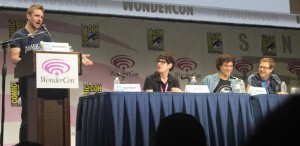 Nerdist founder Chris Hardwick took the stage, joined by panellists Paul Provenza, Troy Conrad, and Matt Bennett, on March 31st, in the lead up to the season finale of The Walking Dead. Hardwick’s job as host of Talking Dead meant there was plenty of frisson in the audience about the upcoming show, and Hardwick teased, but didn’t deliver, spoilers on the show’s finale several times. In fact, he informed the audience that he was about to “get into a car to film Talking Dead” following his WonderCon appearance. Envy at his early viewing of the finale was palpable.
Nerdist founder Chris Hardwick took the stage, joined by panellists Paul Provenza, Troy Conrad, and Matt Bennett, on March 31st, in the lead up to the season finale of The Walking Dead. Hardwick’s job as host of Talking Dead meant there was plenty of frisson in the audience about the upcoming show, and Hardwick teased, but didn’t deliver, spoilers on the show’s finale several times. In fact, he informed the audience that he was about to “get into a car to film Talking Dead” following his WonderCon appearance. Envy at his early viewing of the finale was palpable.
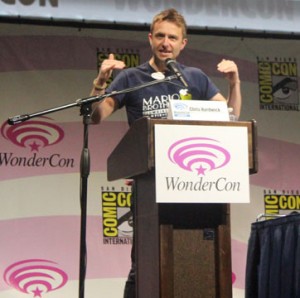 While Hardwick has a cult following as host of Talking Dead, and also from plenty of Nerdist projects, his presence live is even more dynamic, bringing with it plenty of his stand up comedy background. Since it was also Easter Sunday, Hardwick opened with a relevant quip: “That’s one person who came back from the dead and didn’t do it to rip someone’s heart out. Just put the love in it”. About a thousand attendees found this hilarious. Hardwick showed a promo video preview of upcoming Nerdist projects, often punctuated by applause and cheers from the audience when they recognized an anticipated segment or a celebrity guest coming up on a project, and followed by discussing several of the projects in a little more detail with his panellists.
While Hardwick has a cult following as host of Talking Dead, and also from plenty of Nerdist projects, his presence live is even more dynamic, bringing with it plenty of his stand up comedy background. Since it was also Easter Sunday, Hardwick opened with a relevant quip: “That’s one person who came back from the dead and didn’t do it to rip someone’s heart out. Just put the love in it”. About a thousand attendees found this hilarious. Hardwick showed a promo video preview of upcoming Nerdist projects, often punctuated by applause and cheers from the audience when they recognized an anticipated segment or a celebrity guest coming up on a project, and followed by discussing several of the projects in a little more detail with his panellists.
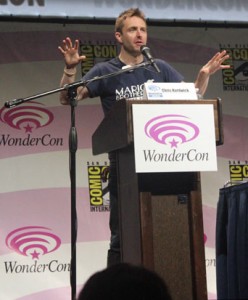 Bennet’s new series, currently being filmed, entitled Nerdy Jobs, a play on Dirty Jobs, got particular attention. The series will involve him visiting nerdy “cool” companies like tech industries and comic book shops to give an insider’s view of working there. Hardwick pondered what Bennett would find to say if he visited NASA for the show: “Uh, sorry about your funding?”. Another big push for Nerdist is the launch of a comedy combination of stand up and improv based on the British series concept Setlist, a competition that will tour around the world. As a veteran of stand up, Hardwick was particularly enthused, commenting that forcing stand up comedians into an improv situation is like “looking for the God particle of comedy”. His request to the audience about the upcoming new shows: “Please don’t feel compelled to say horrible things IN ALL CAPS in comment threads”.
Bennet’s new series, currently being filmed, entitled Nerdy Jobs, a play on Dirty Jobs, got particular attention. The series will involve him visiting nerdy “cool” companies like tech industries and comic book shops to give an insider’s view of working there. Hardwick pondered what Bennett would find to say if he visited NASA for the show: “Uh, sorry about your funding?”. Another big push for Nerdist is the launch of a comedy combination of stand up and improv based on the British series concept Setlist, a competition that will tour around the world. As a veteran of stand up, Hardwick was particularly enthused, commenting that forcing stand up comedians into an improv situation is like “looking for the God particle of comedy”. His request to the audience about the upcoming new shows: “Please don’t feel compelled to say horrible things IN ALL CAPS in comment threads”.
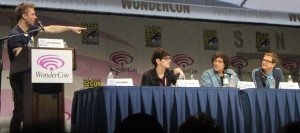 This led Harwick to speak for a moment about Youtube as a venue for hosting programming. Though delivered in a comically serious tone, the message had some bite: “No longer do companies tell us what to watch”. It was the first of several comments that indicated that Hardwick still has a lot to say about the role of open access and its giant-killing capabilities in relation to big media. Nerdist Industries, he said, is going to be expanding, but not along the lines of some of their peers on Youtube, who branch out into “piles of channels”; instead, they are aiming for a “hyper-curated partnership” with 6-8 channels and plenty of intensive “cross promotion”. They are also considering a move, based on fan request, to try out video podcasts, though Hardwick is a little skeptical of why people would want to watch them. Demand has been high enough that he’s prepared to yield to the experiment. Upcoming guests for the video podcast will include Seth Rogan, Steve Young, Scott Adsit and “surprises” too. Nerdist will also, finally, launch a major app to link to its content and, even more surprisingly, will be venturing into filmmaking following their purchase by Legendary Entertainment. They hope to work as producers on smaller budget films in this new role.
This led Harwick to speak for a moment about Youtube as a venue for hosting programming. Though delivered in a comically serious tone, the message had some bite: “No longer do companies tell us what to watch”. It was the first of several comments that indicated that Hardwick still has a lot to say about the role of open access and its giant-killing capabilities in relation to big media. Nerdist Industries, he said, is going to be expanding, but not along the lines of some of their peers on Youtube, who branch out into “piles of channels”; instead, they are aiming for a “hyper-curated partnership” with 6-8 channels and plenty of intensive “cross promotion”. They are also considering a move, based on fan request, to try out video podcasts, though Hardwick is a little skeptical of why people would want to watch them. Demand has been high enough that he’s prepared to yield to the experiment. Upcoming guests for the video podcast will include Seth Rogan, Steve Young, Scott Adsit and “surprises” too. Nerdist will also, finally, launch a major app to link to its content and, even more surprisingly, will be venturing into filmmaking following their purchase by Legendary Entertainment. They hope to work as producers on smaller budget films in this new role.
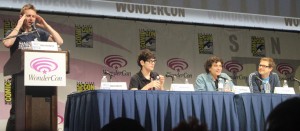 While Hardwick was delivering his energetic spiel, Provenza interjected, “Do you ever sleep?”. It was true, Hardwick looked a little peaked. “I have a robot heart”, he intoned, and continued on to the question and answer period. Questions began with a repeat offender from SDCC who Hardwick had once hugged in the past for his super fandom regarding Superman. “Comic Con is about getting super freaked out about stuff you love”, Hardwick reminded the audience (and he would deliver another hug later to a girl dressed as Wario in sympathy with his own Mario Brothers t-shirt). Harwick was then asked what he would do if his girlfriend was found to be “patient zero” in a potential zombie apocalypse. “Oh, I’d shoot her in the fucking head. That’s what you do for your loved ones”, he said without hesitation, to much hilarity, and added that he hoped she’d do the same for him.
While Hardwick was delivering his energetic spiel, Provenza interjected, “Do you ever sleep?”. It was true, Hardwick looked a little peaked. “I have a robot heart”, he intoned, and continued on to the question and answer period. Questions began with a repeat offender from SDCC who Hardwick had once hugged in the past for his super fandom regarding Superman. “Comic Con is about getting super freaked out about stuff you love”, Hardwick reminded the audience (and he would deliver another hug later to a girl dressed as Wario in sympathy with his own Mario Brothers t-shirt). Harwick was then asked what he would do if his girlfriend was found to be “patient zero” in a potential zombie apocalypse. “Oh, I’d shoot her in the fucking head. That’s what you do for your loved ones”, he said without hesitation, to much hilarity, and added that he hoped she’d do the same for him.
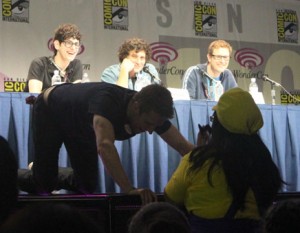 He seemed pretty serious about that topic, but not as serious as he became immediately after the question on the subject of open access production. “There is literally no excuse for you not to pursue things that you love now. You are living half a life if you do not pursue the things that you love”, he said, referring to the tools now available for fans and pop culture creators alike. When a middle school teacher asked him for ideas to keep her students interested in pop culture in their newly formed lunch club, he gave a very invested answer, repeating that the most important thing the teacher could do for them would be to get them to “make things”, whether videos, or other media. “Teach them to be creators vs. consumers”, he pleaded, to much approbation from the crowd.
He seemed pretty serious about that topic, but not as serious as he became immediately after the question on the subject of open access production. “There is literally no excuse for you not to pursue things that you love now. You are living half a life if you do not pursue the things that you love”, he said, referring to the tools now available for fans and pop culture creators alike. When a middle school teacher asked him for ideas to keep her students interested in pop culture in their newly formed lunch club, he gave a very invested answer, repeating that the most important thing the teacher could do for them would be to get them to “make things”, whether videos, or other media. “Teach them to be creators vs. consumers”, he pleaded, to much approbation from the crowd.
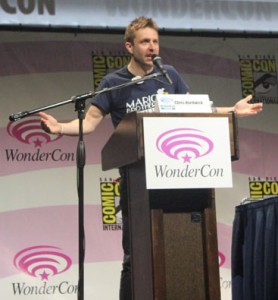 One of Hardwick’s winning qualities that keeps him from drifting too far from his fanbase due to his ever increasing media success is his earnestness, often placing himself in the role of the fan once more. He described himself as a “lamprey” feeding off the “giant sperm whale” of pop culture products and feeling grateful, trying not to “impose” when working with actors from major shows. The Nerdist panel emphasized again that Hardwick still sees himself as an outsider in the mainstream, and an insider to “nerd” culture, no matter how many celebrity friends he accrues. That lends credence to his requests and his advice that fans continue to interact directly with the things they love through becoming “creators” too.
One of Hardwick’s winning qualities that keeps him from drifting too far from his fanbase due to his ever increasing media success is his earnestness, often placing himself in the role of the fan once more. He described himself as a “lamprey” feeding off the “giant sperm whale” of pop culture products and feeling grateful, trying not to “impose” when working with actors from major shows. The Nerdist panel emphasized again that Hardwick still sees himself as an outsider in the mainstream, and an insider to “nerd” culture, no matter how many celebrity friends he accrues. That lends credence to his requests and his advice that fans continue to interact directly with the things they love through becoming “creators” too.
Photo Credits: All photos in this article were taken by semi-professional photographer and pop culture scholar Michele Brittany. She’s an avid photographer of pop culture events. You can learn more about her photography and pop culture scholarship here.
Hannah Means-Shannon writes and blogs about comics for TRIP CITY and Sequart.org and is currently working on books about Neil Gaiman and Alan Moore for Sequart. She is @hannahmenzies on Twitter and hannahmenziesblog on WordPress.
Blog: PW -The Beat (Login to Add to MyJacketFlap)
JacketFlap tags: jmanga, dcu chaos, more to come podcast, peprsepolis, Podcasts and other media, Top News, Add a tag
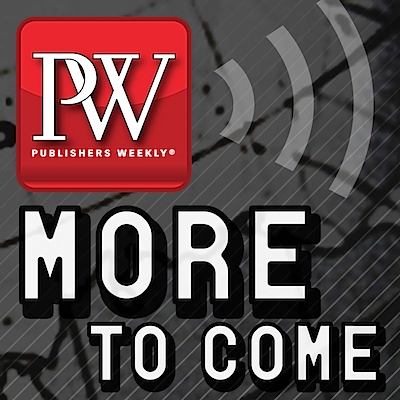
People often ask me “Why don’t you do a podcast?”
I answer, “I do.”
This week on More To Come 46: Exit JManga, Persepolis Banned, myself, Calvin Reid and Kate Fitzsimons – discuss the closing of JManga, the Chicago school ban on Persepolis, writer turnover and turmoil at DC, the digital promotion that crashed Comixology and Marvel, a very interesting panel on Fredric Wertham and much more on PWCW’s More to Come. It was a mad crazy two weeks of news and we’re all over it!
Blog: PW -The Beat (Login to Add to MyJacketFlap)
JacketFlap tags: News, Podcasts and other media, Top News, Add a tag
People often ask me "Why don't you do a podcast?" I answer "I do."
Blog: PW -The Beat (Login to Add to MyJacketFlap)
JacketFlap tags: Culture, Commentary, Podcasts and other media, Top News, News, Interviews, Add a tag
Comic book podcasting has become more and more popular over the years, but House To Astonish remains the one to beat. Hosted by Paul O’Brien (hey, that name’s familiar) and Al Kennedy, the fortnightly show is a funny, insightful look at the current top comic books and the world around them. As part of their never-ending mission to interview the world (not true: they don’t typically run interviews), Al came down to Thought Bubble this year to mingle with the stars.
In the process, he put himself in my crosshairs, and we sat on a cannon (true) to talk about how House To Astonish was started, what it’s about… and how Mark Waid was integral to the whole thing starting out.
Steve: How’re you finding Thought Bubble so far?
Al Kennedy: I got thrown out the bar last night at 3am, which is always a good way to start a convention. They moved us out the bar and into the foyer, and then out the foyer and into the street.
Steve: ….So! You were both bloggers before you started House to Astonish. You did 100 Days of Comics, and Paul writes The X-Axis. How did you get started in comics commentary?
Al: I decided to set myself a writing challenge, where I’d write about something every day. I figured that comics would be something I could easily find things to talk about, so every day I did an essay about something to do with them. It was more an exercise in writing discipline than me having 100 burning things to say about comics, but I really enjoyed doing it as well.
Once it wrapped up, Paul and I had known each other for many many years.We were sat in the pub one night and talking about online comics journalism, and thought “well why don’t we do one of these new-fangled podcasts?” Back when we started it was a far less packed field, and that’s where the thing came from.
Steve: Who else was around?
Al: iFanboy… and John Siuntres was already doing his thing… a few others!
Steve: Do you view it podcasting as a community, or does it feel like you’re all in competition?
Al: I think that the field is broad enough and people are doing enough different things to allow for different voices to be heard. I know that there are some groups of podcasters, where if you listen to one, you’re likely to listen to all of them. I know we share an audience with Graeme and Jeff at Wait, What?, for example. There’s certainly some crossover with Evie and Aaron of Awesomed By Comics, as well as Chris and Euge/Chris and Matt at War Rocket Ajax – although I think their audience is larger than ours!
Steve: Many other podcasters focus on reviews and interviews, but House to Astonish starts with a news roundup. Was that always the idea? That the podcast would focus on criticism and commentary?
Al: Yes. We decided to steer away from interviews for the most part… although… I am here to do some interviews… because the thing about doing interviews is that you have a very high bar to clear in John Siuntres. He’s absolutely brilliant, and if you go into podcasting with an aim to do interviews, you’d better be able to keep up with him.
Originally we were going to do a round-up of what people are saying on blogs and message boards as well as an editorial-style polemic we’d deliver each episode. But instead it turned out that we went on tangents and talked nonsense. So we start with news stuff, three reviews, and then some mucking around at the end.
Steve: Do you think of yourself as a journalist? Does podcasting sit alongside journalistic sites like, say, Robot 6, or Comics Reporter?
Al: I don’t see us as journalists. I think we’re commentators, which is a different thing. In terms of comics journalism, there are a few really terrific sites which cover the majority of aspects of the comics industry, and beyond that I don’t think we have that much to offer in terms of actual reportage. We talk about the news and hopefully share some, but we’re both reviewers – Paul obviously has been doing the X-Axis for 15 years, and I’ve done my own bits and pieces through 9th Art and 100 Days. But we don’t report or investigate, and get scoops and news, so I don’t think it’s journalism.
I like to think that especially in light of legal issues – Paul and I are both lawyers in our day jobs – we try to look into stories and work out what is actually going on, and what the ramifications are. We do go beyond the press releases where we can. History is written by the winners, so when you see a legal verdict reporte, there’s often a framing around it which backs whoever won the case. Which is fine, but you need to be able to look beyond it as well. I think just regurgitating news is not helpful to people. If they just wanted to see press releases, they can just go online and find them. I think we offer a discursive aspect beyond mere repetition, and do it with good humour and a bit of insight
Steve: I think that’s the case with your review, as well. Unlike perhaps some other podcasts, you don’t just review the same 3 comics every episode – you’re going beyond the standard choices and picking new comics to review. Is that a conscious decision – to review things other people don’t?
Al: Absolutely. We each order a lot of first issues, which we will not follow up on. We don’t read many issue 2′s. We go through a lot of first issues and starts of new story arcs, new creator teams etc, because we like to keep it varied and bring different things to people’s attention. I know Paul and I are also both Marvel kids at heart, but we do try to make sure at least one of the three books isn’t a big two title, or is non-superhero.
We try also not to have two books by the same publisher, as well. Sometimes it’s unavoidable – we could easily, this week, do three Marvel Now books. This week there’s a new issue #1 for Fantastic Four, Thor, X-Men Legacy, All New X-Men, but we’ll only do one of them, and focus elsewhere for the other two. Colder was also out this week, and that was excellent. 47 Ronin was excellent.
There are a lot of options, and I think it does a disservice when you review the same three books every time.
Steve: Do you ever think to go further and do digital work, or webcomics?
Al: We have done it to some extent with Bandette from Monkeybrain, which was terrific. We tend to have quite a well-trodden remit in that we usually pick three print books. People have asked us to review webcomics and serials, but I think it requires a different approach. Somebody asked if we would review Penny Arcade – but it’s a different format. It’s a three-panel strip, and it’s not the same as reviewing a print issue.
Steve: Do you find with reviewing that it can sometimes be hard, if you know the creators involved? How do you go about reviewing a comic if you know the writer or artist?
Al: I was actually talking about this a few weeks back. I don’t know if you saw this, but there was a furore about games journalists being too close to studios and publicists.
Because we only do three books an episode and we’re not in America, doing interviews, we tend to not have as much contact with creators as some other have. I am good friends with Kieron Gillen, but we’ve been friends since before he was a comics writer, and we tend not to review stuff by people we know. Sometimes we do, but we would never review it because they are our friend and we want to give them some publicity. If we do interview someone we know we make sure we’re upfront about it, and call them a friend of the podcast.
I think you have to be upfront, declare the interest you might have, and then be as objective as you can.
Steve: You finish with a feature called The Official Handbook to the Official Handbook of the Marvel Universe, in which you scour the old Marvel handbooks for an obscure character, and then walk listeners through their history, which tends to be really really weird. How did you come up with that idea?
Al: ….this is all lost in the mists of time…
We knew we wanted to do something to round the podcast out which was funny, and we’re both nerds for the official handbook – I have every one that’s been published. We decided it would be fun to look through the handbooks and come up with characters who are silly and ridiculous, and wonder how they could be rehabilitated I think Wizard magazine used to have a feature similar, called Mort of the Month, where they’d pick an old character and slag them off. What we try to do is take that further and wonder if there’s anything we can do to rehabilitate them.
Speaking of the mists of time — I found recently a bit of paper which had all the names we came up with when first trying to name the podcast, and I think I’ll put them up for the 100th episode.
Steve: How did you decide on House to Astonish?
Al: House to Astonish itself came from the Amalgam Comics. In the wake of Marvel vs DC they did a series where two characters would be smooshed into one body – like Darkclaw, who was a mix of Wolverine and Batman. He fought a cross between joker and sabretooth called Hyena. There were some great ones, and they obviously enjoyed doing it – they took Ice Cream Soldier from Easy Company, mixed him with Izzy Cohen from Howling Commandos, and came up with Ice Cream Cone.
Apparently a load of titles were pitched, and Mark Waid pitched House to Astonish, which would mix House of Mystery and Tales to Astonish. I think I read that in 1997 and thought it’d be a fun name.
Steve: How do you think the podcast has developed over the years you’ve done it?
Al: We haven’t changed anything! We’re basically creatures of habit.
We’re better at it, and more confident, I suppose. There were more pregnant pauses and talking rubbish when we were starting out- not that the rubbish quotient has gone down, but we talk better rubbish now. One thing we tried to always do was keep it short – one hour is about as long as you’d want to go.
Joining Comics Should Be Good has been an honour, and it’s terrific to be a bit more well-known and respected than when we started. Our impressions are… better?
I think we’re part of a community now. We’re part of a firmament. we’ve been around so long we’re probably not going away now. In that we’re like Action Comics – once you hit a certain number, you’re here to stay.
Many thanks to Al for his time. And as luck would have it, a new episode of House to Astonish was released only a few hours ago! You can find it at the website, and find Al on Twitter @housetoastonish. Paul is also on Twitter, at @ifdestroyed
Blog: PW -The Beat (Login to Add to MyJacketFlap)
JacketFlap tags: Podcasts and other media, Twiddle Rompus, Add a tag
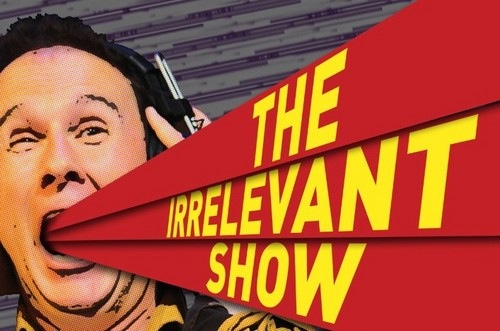
Eisner nominated writer Ian Boothby is probably best known for his work on The Simpsons comics, but he also contributes to the Canadian humour radio programme, The Irrelevant Show. Now all his superhero themed sketched have been collected in one webisode.:
As an appetizer for the coming season, we’ve put together some of our favourite Superhero sketches in a special Webisode! You’lll hear Superman is a Jerk, Woman-Man, and the Supervillain Lifetime Achievement Award, plus many more. Enjoy, nerds and non-nerds alike!
We can’t embed it but it’s available in the link.
View Next 25 Posts



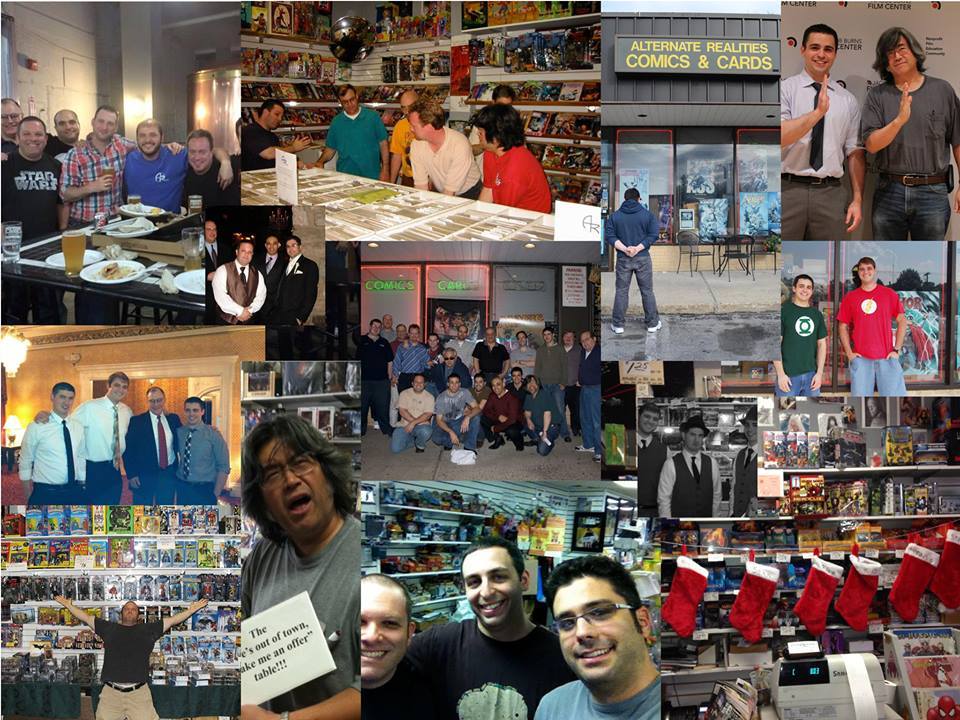


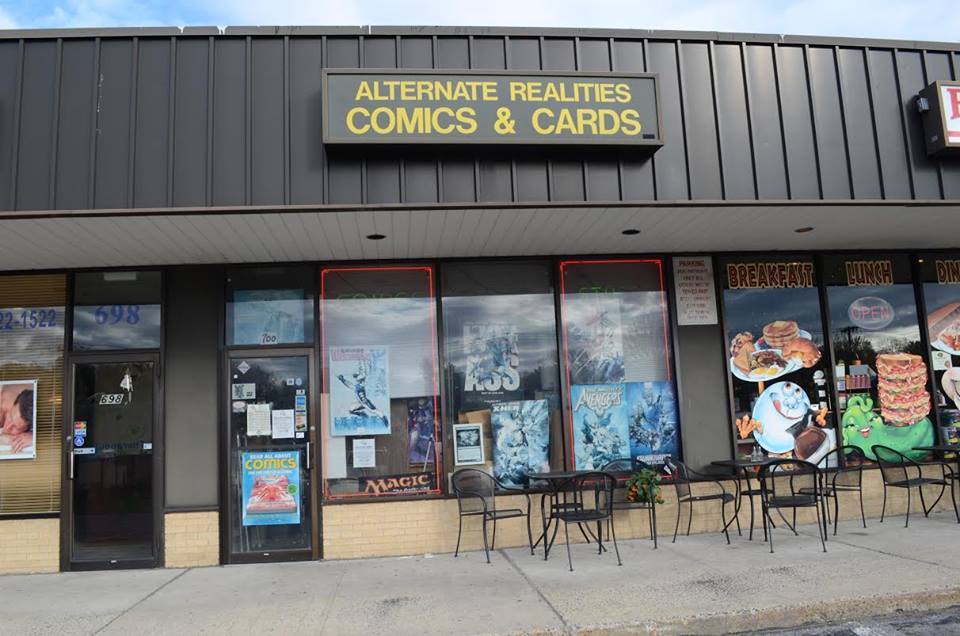

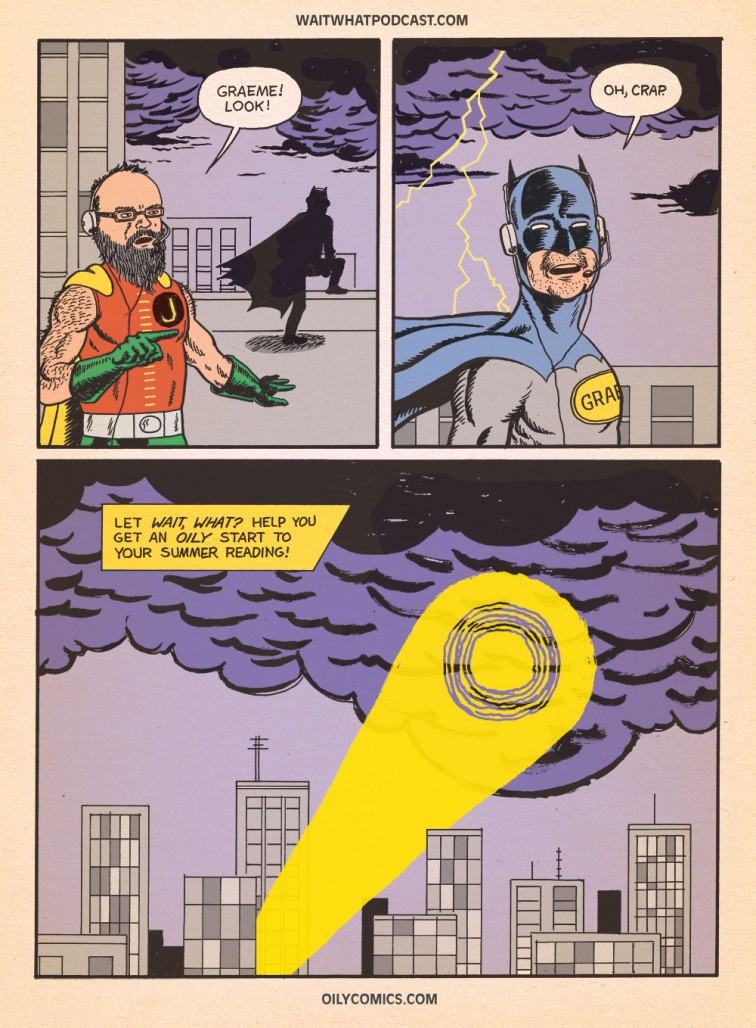
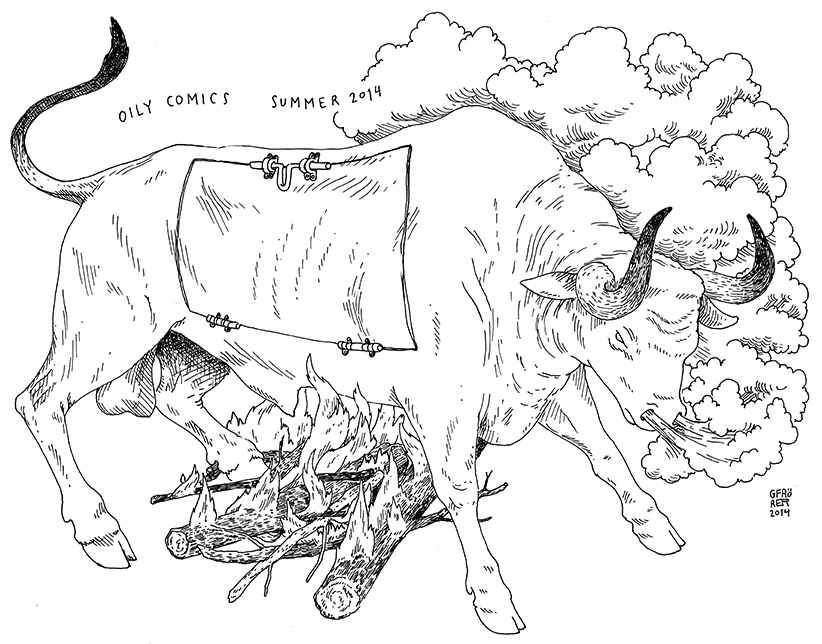


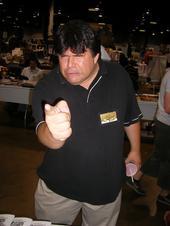

Why would Kylo Ren be able to lift the hammer? He isn’t worthy. Force or no force, that doesn’t change.